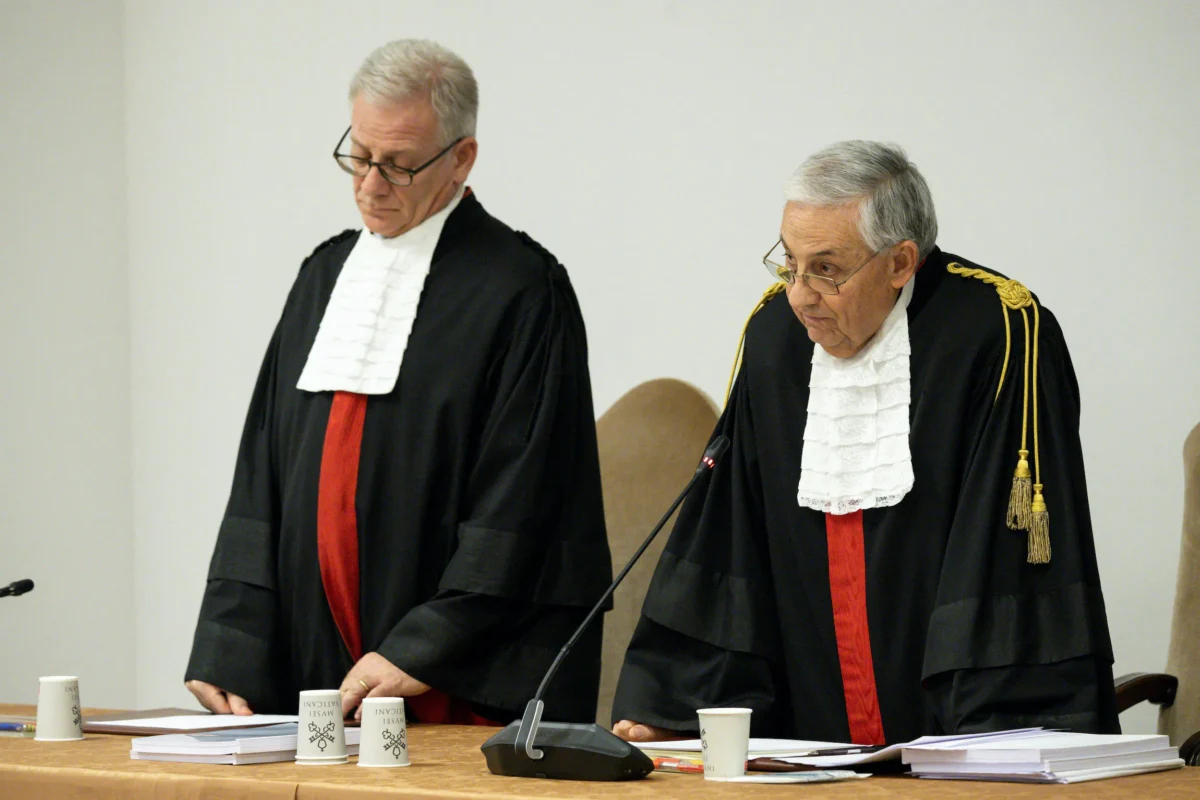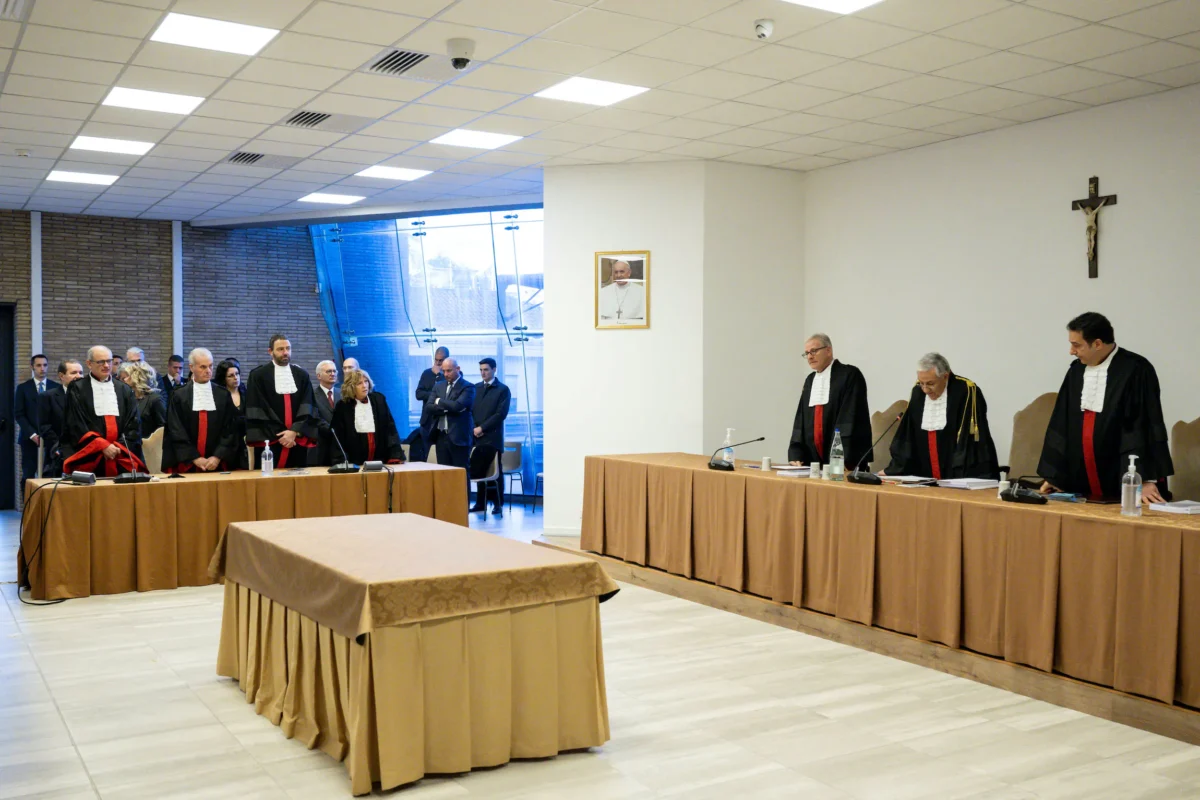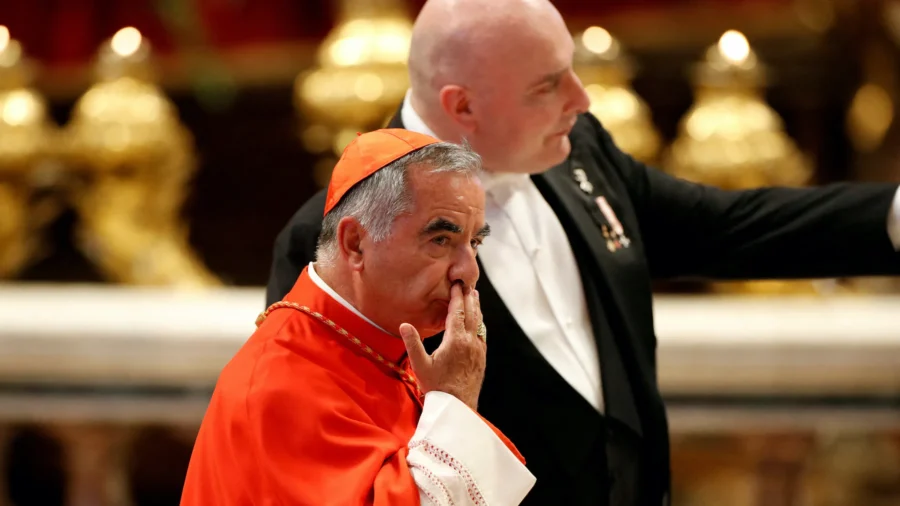A Cardinal in the Vatican has been convicted of embezzlement and fraud in a case of millions of dollars and given a jail sentence, becoming the highest level cleric to have ever stood trial in the Catholic church yet.
Cardinal Angelo Becciu has been given a sentence of five-and-a-half years in jail, after he was found guilty of fraud and other crimes during his time as the number two person in the Vatican’s Secretariat of State, a government department handling diplomacy and administrative tasks for the minuscule country.
Cardinal Becciu, who lives in the Vatican, has denied the allegations and has since announced an appeal. He is expected to remain free until the appeal is resolved.
In all, 10 defendants were accused of crimes including fraud, abuse of office, and money laundering on Saturday. All denied wrongdoing.
It took Court President Giuseppe Pignatone 25 minutes to read all the verdicts and sentences.
Cardinal Becciu, like most of the other defendants, was convicted on some counts and acquitted of others. Only one defendant, Cardinal Becciu’s former secretary, Father Mauro Carlino, was acquitted of all charges.
The trial, which exposed infighting and intrigue in the highest echelons of the Vatican, lasted for 86 sessions over two-and-a-half years.
It revolved mostly around the messy purchase of a building in London by the Secretariat of State in 2013 and 2014, where Cardinal Becciu, then an archbishop, was serving.

Irresponsible Investment
With Cardinal Becciu in leadership of the department, the Secretariat of State started investing in a fund managed by Italian financier Raffaele Mincione, securing about 45 percent of the building at 60 Sloane Avenue, in an upmarket district of the city.
Mr. Mincione was found guilty of embezzlement and money laundering and given the same sentence as Cardinal Becciu.
The court said Cardinal Becciu had been irresponsible and “highly speculative” to invest more than $200 million in Mr. Mincione’s fund between 2013 and 2014, noting this was about a third of the holdings of the Secretariat of State at the time.
In 2018, with Cardinal Becciu in another Vatican job, the Secretariat of State felt it was being deceived by Mr. Mincione and turned to another financier, Gianluigi Torzi, for help in squeezing Mr. Mincione out and buying the rest of the building.
Mr. Torzi also fleeced the Vatican, according to prosecutors. He was found guilty of fraud and extortion and sentenced to six years.
The Vatican sold the building last year, taking an estimated loss of about 140 million euros ($150 million).

Other Accusations of Fraud
Cardinal Becciu, who was fired by Pope Francis from his next job in 2020 for alleged nepotism but remains a cardinal, was also found guilty of embezzlement for funneling money and contracts to companies or charities controlled by his brothers on their native island of Sardinia.
Another accusation involved his hiring of Cecilia Marogna, a self-styled security analyst, also from Sardinia, as part of a secret project to help win freedom for a nun who had been kidnapped in Mali.
Ms. Marogna, 46, received 575,000 euros from the Secretariat of State in 2018-2019. The money was sent to a company she had set up in Slovenia and she received some in cash, prosecutors told the court.
Italian police said Ms. Marogna had spent much of the money on luxury clothing and health spas. Both she and Cardinal Becciu were found guilty of aggravated fraud related to the transfer of money and Ms. Marogna was ordered to return the money to the Vatican.
Enrico Crasso, a banker who managed funds for the Secretariat of State, was convicted of money laundering and sentenced to seven years. Fabrizio Tirabassi, who worked in the Secretariat, was sentenced to seven-and-a-half years.
The court ordered Cardinal Becciu, Mr. Mincione, Mr. Tirabassi, and Mr. Crasso to repay a total of more than 100 million euros to the Vatican.
Nicola Squillace, a lawyer who worked with both Mr. Crasso and Mr. Tirabassi, was given a suspended sentence of a year and 10 months.
Rene Bruelhart, a Swiss lawyer and former president of the Vatican’s Financial Intelligence Unit; and its director, Italian Tommaso Di Ruzza, were convicted of administrative omission and ordered to pay small fines.
Behind Bars?
None of the six people who received jail sentences will likely be spending time behind bars anytime soon and some perhaps not ever, according to legal and security experts.
Several, including Cardinal Angelo Becciu and Mr. Mincione, already have announced appeals. Others are expected to join them.
A new trial would likely not start before the end of next year and take at least another year to conclude. The court is not expected to publish its lengthy report explaining the reasoning for its decisions before April 2024, legal experts said.
Normally, those awaiting appeals in Vatican cases, whose incarceration procedures closely mirror Italy’s, are allowed to remain free unless they have committed violent crimes or are a flight risk.
Cardinal Becciu is the only Vatican citizen among those sentenced. He lives in an apartment inside the tiny city-state, which Pope Francis allowed him to keep after he was abruptly fired in 2020 on accusations of nepotism.
The Pope has already stripped Cardinal Becciu of his right to enter the conclave that would choose the next pope after his death or resignation.
As supreme monarch, Pope Francis could pardon Cardinal Becciu for the financial crimes and mete out some other symbolic punishment, such as ordering him to leave the Vatican and to return to his native Sardinia, one expert said.
In 2012, the late Pope Benedict pardoned his butler, Paolo Gabriele, who was convicted of leaking sensitive documents and was sentenced to 18 months in jail.
Mr. Gabriele spent about three months in the barracks of the Vatican police, which has about four rooms that are used as cells. They have bars on the windows and reinforced steel doors.
Reuters contributed to this report.

